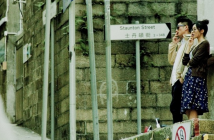
Goodbye South, Goodbye (1996)
Cast: Hsiang Hsi, Kuei-Ying Hsu, Annie Shizuka Inoh
Directors: Hsiao-Hsien Hou
Country: Taiwan | Japan
Genre: Drama | Crime
Editor’s Notes: The following review is part of our coverage for TIFF’s Good Men, Good Women: The Films of Hou Hsiao-hsien. For more information on upcoming TIFF film series visit http://tiff.net and follow TIFF on Twitter at @TIFF_NET.
The rhythmic drones of a train as it heads down unknown tracks to unknown destination and Hou’s Goodbye South, Goodbye has effectively set the tone for what is to come. The movement of a train has been a staple of cinema since its inception. It has power that is rooted in centuries of pre-established conventions and those tropes have drilled an idea that we might not be consciously aware of. We know that change is coming, but we do not yet know the type of transition we will be forced to contend with. The train represents the departure of an old set of ideals, a harbinger of the death of an old way of thinking as it is replaced by the selfish individualism and materialistic trappings of western culture. History has altered the connotations of the train as quicker and more convenient modes of transport have rendered it obsolete. The optimism and technical wonderment of Lumiere’s train has finally left the station, and all we are left with are the broken promises and soul-muting malaise of modern civilization.
The rhythmic drones of a train as it heads down unknown tracks to unknown destination and Hou’s Goodbye South, Goodbye has effectively set the tone for what is to come.
Hou’s train is a time machine that provides the essential connectivity between two worlds. It is a transport of nostalgia and long forgotten ideals. Its weary travelers are unable to find contentment in either of those worlds. The old world is too restricting for someone who has been programmed by selfish excess, and the new world holds nothing but artifice and the malaise of a life defined by unaware materialism. It is in the visual representation of these two worlds where Hou’s genius is really allowed to shine.

The old world is shot with framing and compositions that are informed by Mizoguchi. We are not afforded close-ups in this old world as they would be inappropriate for the way of thinking that is being presented. We are given medium range shots with deep focus where multiple characters occupy the frame, along with the elements of daily living that would be appropriate for the particular setting. The individual is lost in these frames, and one gets a sense that the attitude has shifted from materialism and individuality toward an older way of thinking where community and protocol are as highly treasured as money in the modern world. The visual genius of the film comes in when a person has a foot firmly planted in both worlds and has to duck out of the old world and travel to the new, but Hou does this in a single shot. A character inhabits the old world and the camera follows suit and frames them at a medium range, he steps toward the camera to join his friends to discuss their criminal activities and suddenly the visuals are informed by modern ways of thought as it gets in close. We are given a much more shallow focus and character centric framing as the character sells a little more of his soul to take one step forward and three back.
Hou’s train is a time machine that provides the essential connectivity between two worlds.
One gets the impression that the “South” of the title that he is lamenting the passing of, is not as much a place as a myriad of factors. Hou laments the passing of community and flawed and seemingly illogical traditions. He mourns the passing of the attitudes of older generations that valued family and possessed selflessness and found more divine inspiration for living than money and excess. He laments a world that is filled with multitudes of green as the leaves, trees, and sun carry out their eternal orchestra of light and color. One can only approximate these kinds of green by wearing tinted glasses in the new world. This is why every shot in the new world eventually leads to a shot of the horizon as the old world and old way of thinking draw Hou back. He then smash cuts us from new world to old, and the framing and focus shifts once again. Hou realizes that the transience of the old world is a necessary and inevitable evolution, but he doesn’t have to like it.
Hou laments the passing of community and flawed and seemingly illogical traditions. He mourns the passing of the attitudes of older generations that valued family and possessed selflessness and found more divine inspiration for living than money and excess.



